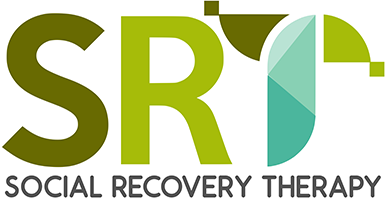Psychotic Experiences As A Barrier To Social Recovery
SRT Psychotic Experiences are often experienced by people struggling with social disability. These experiences can vary; they may be visual (seeing things which other people cannot see, everyday objects appearing to change shape or being strange) auditory (sounds or voices that others cannot hear) and tactile (odd sensations) among others. Some people may also experience ideas of reference or other unusual or unshared thoughts, such as thinking that other people can overhear their thoughts or want to harm them. Such experiences may be confusing and frightening, and understandably can become the focus of one’s attention. Psychotic and unusual experiences can present a barrier to social recovery in several ways and patterns of behavioural and cognitive avoidance are likely to emerge in this context.
1. Avoidance of social situations and withdrawal from structured activity due to
- feeling unsafe around other people
- feelings of shame and concern about experienced and/or potential stigma and discrimination
- thoughts and feelings of panic or generalised anxiety
- changing experience of self and future, associated with loss or confusion regarding values and goals
2. Difficulties engaging in social interactions and structured activity due to
- cognitive problems, confusion and disorientation
- distraction by unusual thoughts and perceptions
- difficulties in processing and understanding own and others’ emotions
- social interactions feeling complicated, awkward and complicated
- problems with energy, motivation, interest and enjoyment
3. Problems attending structured and social activities due to
- members of the social network concerned about and/or feeling protective of individual’s safety and wellbeing
- additional financial, practical, physical and physiological barriers
SRT Psychotic Experiences
It is essential to understand the role of these experiences in the maintenance of social disability. Assessing and contextualising unusual experiences will allow for a better understanding of the factors involved in their maintenance, but also how they interact with other ongoing difficulties in preventing social recovery, as conceptualised by the engagement in meaningful structured activity aligned with one’s values. Once a working shared SRT formulation is developed, the first step is likely to involve the exploration of de-catastrophising and normalising rationales and encourage the acceptance of unusual experiences. Traditional CBT techniques such as behavioural experiments and cognitive restructuring can then be used to manage unusual experiences, always with the goal of moving beyond this and towards engaging in structured activity defined through goals, interests and values. Unusual experiences are not the focus of SRT per se, but rather seen as another factor in constellation of barriers to social recovery.
Additional resources
SRT Psychotic Experiences Training Package – DOWNLOAD
CBT for psychosis and at risk mental states
Fowler, Garety, & Kuipers (1995) Cognitive Behaviour Therapy for Psychosis: Theory and Practice: DOWNLOAD
French & Morrison (2004) Early Detection and Cognitive Therapy for People at High Risk of Developing Psychosis READ MORE
Normalisation
Voice Collective READ MORE

